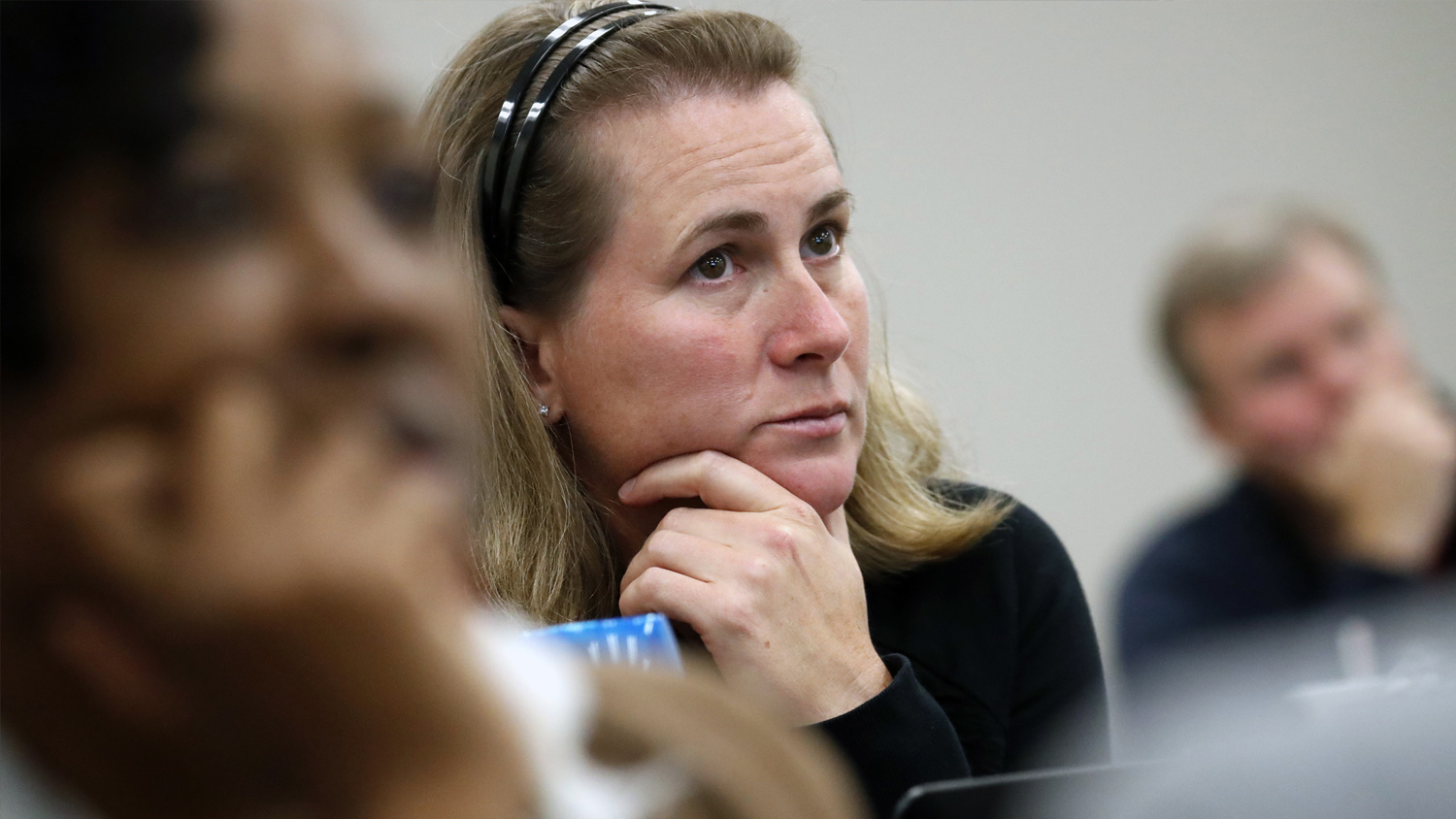How the NC State College of Education is Addressing Workforce Development Goals

With more than half of all employers in North Carolina saying they are unable to hire the workers they need because of a lack of employability and technical skills, the state is facing a skills gap.
Currently, 67% of jobs in North Carolina require a postsecondary degree or high-quality credential, but less than 50% of residents between the ages of 25 and 44 have those qualifications. Reports show that the state is largely relying on outside talent to fill that gap, but the NC State College of Education is working to help grow talent in the state through a focus on adult learners.
“Narrowing the skills gap requires strong technical training and workforce development. Our faculty and staff have developed initiatives and designed programs to provide this and ensure educational leaders and adult learners are equipped to meet workforce demands,” said NC State College of Education Dean Mary Ann Danowitz, D.Ed. “This focus area aligns with our land-grant mission to respond to North Carolina’s greatest needs, including improving educational attainment and preparing a highly-trained workforce.”
[spotlight-box label=”” img=”” heading=”Preparing K-12 Teachers Who Equip Their Students With STEM Workforce Capabilities” cta=”Read More About How We Became Leaders in STEM Education” url=”https://ced.ncsu.edu/news-new/news/stem-ed-leaders/”]
In addition to enhancing opportunities for adult learners to develop skills needed to meet North Carolina’s workforce demands, the NC State College of Education prepares K-12 educators who equip their students with STEM workforce capabilities. NC State is the largest producer of STEM educators in North Carolina; and in 2006, the College of Education started the state’s only STEM-focused elementary education program.
Preparing STEM-focused elementary educators is important because research shows that cultivating STEM skills must start as early as possible. “We hear a lot about how it’s important to get students into the STEM pipeline as early as kindergarten,” says James Minogue, Ph.D., associate professor of elementary science education. “Teachers are critical actors in that. They touch these young learners every day just as they step foot into that pipeline.”[/spotlight-box]
Most recently, U.S. Department of Labor Secretary Eugene Scalia announced at NC State on Tuesday, Feb. 18, that Carla C. Johnson, Ph.D., a professor of science education, will lead a four-year, $6 million grant project to develop the AI Academy, a workforce development program that will prepare 5,000 artificial intelligence (AI) professionals for North Carolina and beyond.
Entitled “Artificial Intelligence Academy: North Carolina Apprenticeships for Innovation” and part of the labor department’s 28 public-private apprenticeship partnerships totaling nearly $100 million, the program will collaborate with nearly a dozen industry partners who provide paid apprenticeships while the participants complete online coursework delivered by the AI Academy in two pathways through: Basic Artificial Intelligence or Advanced Artificial Intelligence. Graduate credit will be provided by Purdue Global.
The AI Academy will enroll its first cohort of apprentices in January 2021 and target its recruitment on veterans, underrepresented workers, underemployed workers, informational technology employees and those seeking an opportunity to move into a different career.
“Our consortium will lead and inform the important work of building a pipeline of highly qualified and well prepared AI talent for North Carolina and beyond,” Johnson said.
The new funding is in addition to Johnson’s work on a $12 million grant-funded project announced in July that focuses on creating apprenticeships to help fill a growing need for cybersecurity professionals. Through this project, Johnson leads the conceptualization, design and implementation of the research plan and evaluation of the progress of Purdue University’s Cybersecurity Apprenticeship Program.
Johnson noted that there are persistent shortages in qualified talent in the artificial intelligence and cybersecurity workforces, but the rapid rate of technological advances in both fields require unique approaches to training future employees.
“As technological advances grow at incredible speed, our options for preparing professionals to enter these critical fields need to be innovative and designed with opportunities for apprentices to apply what they are learning to authentic industry settings, working alongside people engaged in this work every day,” Johnson said. “Through alternative approaches to preparing individuals with the knowledge and skills they need to be successful in these areas, we are taking big steps to begin to address the talent gap.”

With predictions that two-thirds of all jobs in the future will require some form of postsecondary education, the College of Education also offers advanced degree and certificate programs to help working professionals enhance their training skills to close the talent gap.
The college’s Master of Education in Training and Development prepares professionals to hold internal or external training positions in a variety of sectors, including business, education, industry, government and healthcare. The 100% online graduate program — the only one of its kind in North Carolina — gives professionals opportunities to integrate their experiences with practice as they learn best practices, technologies and tools they can apply to real-world situations.
The program has been designed to align with industry competencies. Readings and assignments are also curated to help students strengthen their resumes and immediately apply their knowledge to their jobs.
“Students benefit by having strong portfolios to share during interviews of real work created with real-life clients, experiential learning experiences that go beyond what can be learned in a textbook and strengthened networks with people in the field,” said Michelle Bartlett, Ph.D., teaching assistant professor and coordinator of the master’s in training and development.
The program’s impact is demonstrated through the experience of Richard Singer, Jay Cook and Michael Von Bargen, who taught initial licensing for nuclear operators at Duke Energy. As NC State’s Online and Distance Education department reported in 2018, all three men enrolled in the Training and Development program to prepare themselves to train the next generation of engineers and were able to immediately apply course lessons to on-the-job situations.
By implementing what he learned, Von Bargen told NC State’s Distance Education and Learning Technology Applications (DELTA) in May 2019 that the success rate for participants in his training course rose by more than 30% while changes that streamlined the program reduced the duration by 22%. These changes resulted in a savings of $1.5 million, he said.
“Graduates of this [training and development] program are workforce ready and, more importantly, students are able to apply what they are learning on the job, immediately helping companies based in North Carolina,” Bartlett said.
The College of Education also offers a graduate certificate in Teaching, Training and Educational Technology. Designed for mid-career professionals, this online, five-course program allows professionals to choose from six specialty areas and tailor the program to meet their needs. Graduates gain the knowledge and skills so they can design and deliver course-related content in face-to-face, technology enhanced and e-learning settings in their respective industries.
Enrollment in the master’s degree program has exploded over the past two years, growing from less than 30 students to over 120 students, with about 100 more enrolled in the certificate program.

In addition to offering opportunities for adult learners, the NC State College of Education is working closely alongside community college leaders to help those institutions align their programs with workforce demand.
Audrey Jaeger, Ph.D., Alumni Distinguished Graduate Professor and executive director of the Belk Center for Community College Leadership and Research, said that community college leaders play a key role in developing the workforce because they can examine the prevalent and emerging industries in their region and create course offerings to match. By doing so, community colleges can graduate future employees who possess valuable skills that can lead to economic stability for themselves, as well as businesses and industry in the region.
The NC State College of Education’s Belk Center for Community College Leadership and Research is supporting community college presidents and trustees with workforce alignment and credential attainment by providing them with the necessary information, tools and skills to understand and address local workforce needs.
For example, the Belk Center hosted a symposium in September that gave community college presidents an opportunity to take an in-depth look at regional and college-specific data related to enrollment, programs and labor market outcomes for students. The event also gave community college leaders an opportunity to assess how well their current programs align with regional employer needs and consider how to ensure students earn credentials with labor market value.
Through the Doctor of Education in Community College Leadership, the college is also developing future leaders equipped to use data to ensure equitable employment opportunities across North Carolina.
“The Belk Center is focused on preparing community college leaders and successful leaders need to be aware of what’s happening in their communities,” Jaeger said. ”When we’re talking about aligning credentials with labor market needs, we’re helping community college presidents identify the labor market needs, current jobs in the region, potential jobs of the future and what credentials will be needed to fill those positions.”
To further prepare a high-quality workforce, the College of Education is working to enhance and strengthen postsecondary Career and Technical Education (CTE) research nationwide through the CTE Research Program at NC State-Sponsored by ECMC Foundation.
ECMC Fellows at universities across the country focus their scholarly efforts on postsecondary career and technical education. Over the past two years, 34 fellows have received financial support for their projects through the three-year, $2 million grant from the ECMC Foundation.
“With this program, we have people who are studying work-based learning, we have people studying community college transfer with the applied associate’s degree, and there are people studying career and technical student organizations,” said James Bartlett, Ph.D., associate professor of workforce and community college education and principal investigator on the project. “They also participate in training institutes and webinars focused on research methodology to prepare them to be researchers in career and technical education.”

In addition to strengthening community college leadership development and CTE research, College of Education faculty are studying the changing requirements in the workforce and the ways in which adults learn.
Associate Professor Susan Barcinas, Ed.D., for example, has been studying health care professionals who come to adult education programs to enhance skills as clinical educators, or become scholar-practice leaders. Her work focuses on examining policies surrounding postsecondary adult learners, to understand how they best learn and how their prior experiences can be assessed and credentialed to ensure they have the skills necessary to continue their studies.
By looking at how expertise and professional judgment is formed, Barcinas said research can understand how to address gaps in the curriculum for educational requirements in certain fields.
“When you combine the concerns over accessibility of education with how rapidly our understanding of what credentials or knowledge are needed to perform in the allied health professions, we have a lot of pressure to get things right,” she said. “If we’re implementing new policies like prior learning assessment, more advanced integration of technology or simulation learning, we need to do a better job of understanding how expertise is formed and how professionals continue to learn and grow throughout their careers.”
Ongoing research on adult learners, partnerships with community colleges and programs that offer pathways for adult learners to earn or enhance their credentials work in tandem to not only help close the skills gap in North Carolina; they also help create economic mobility for residents and support business growth throughout the state.
“We need to make sure that we are producing a workforce that will meet the needs for business and industry in North Carolina,” said James Bartlett. “If we aren’t doing that, we will have people come from outside the state to fill the jobs that pay family sustainable wages and we will continue to have an equity gap between those who have skills and degrees in North Carolina and those who don’t.”
- Categories:


